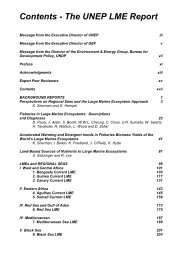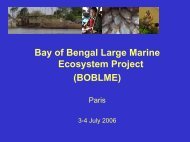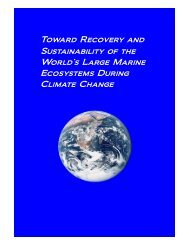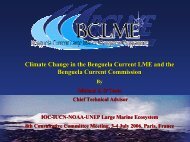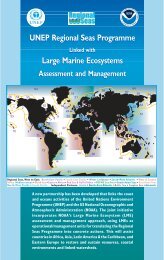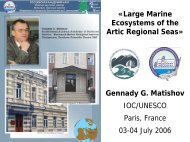Sustaining the World's Large Marine Ecosystems
Sustaining the World's Large Marine Ecosystems
Sustaining the World's Large Marine Ecosystems
Create successful ePaper yourself
Turn your PDF publications into a flip-book with our unique Google optimized e-Paper software.
Preface<br />
This volume, <strong>Sustaining</strong> <strong>the</strong> World’s <strong>Large</strong> <strong>Marine</strong> <strong>Ecosystems</strong>, is a collaborative<br />
effort of NOAA’s <strong>Large</strong> <strong>Marine</strong> Ecosystem (LME) Program, and <strong>the</strong> International<br />
Union for <strong>the</strong> Conservation of Nature (IUCN). The IUCN is <strong>the</strong> world’s largest<br />
global environmental network. Its members include governments, nongovernmental<br />
organizations and 10,000 volunteer scientists in 160 countries. The<br />
IUCN Global <strong>Marine</strong> Programme has eight focus areas related to <strong>the</strong><br />
conservation and sustainable use of oceans: climate change mitigation and<br />
adaptation, coastal livelihoods, <strong>the</strong> conservation of threatened species, energy<br />
and industry, fisheries and aquaculture, <strong>the</strong> management of marine invasive<br />
species, marine protected areas, and ocean governance. The IUCN promotes<br />
large marine ecosystem monitoring, assessment, management and biodiversity<br />
conservation through its support of capacity building and socioeconomic studies<br />
that fur<strong>the</strong>r <strong>the</strong> understanding of ecological processes that drive <strong>the</strong> coastal<br />
economies of developing countries.<br />
<strong>Large</strong> <strong>Marine</strong> <strong>Ecosystems</strong> (LMEs) are regions of ocean space of 200,000 km² or<br />
greater, that encompass coastal areas from river basins and estuaries to <strong>the</strong><br />
outer margins of a continental shelf or <strong>the</strong> seaward extent of a predominant<br />
coastal current. LMEs are defined by ecological criteria, including bathymetry,<br />
hydrography, productivity, and trophically linked populations. The LME concept<br />
for ecosystem-based management with its 5-module approach focused on<br />
productivity, fish and fisheries, pollution and ecosystem health, socioeconomics,<br />
and governance, was selected as a notable scientific breakthrough and<br />
commemorated in 2007 during <strong>the</strong> celebration of 200 years of ocean science by<br />
<strong>the</strong> US National Oceanic and Atmospheric Administration (NOAA) and its<br />
predecessor agencies (http://celebrating200years.noaa.gov/).<br />
LME Projects<br />
One hundred and ten developing countries are presently engaged in 16 joint<br />
international projects in Africa, Asia, Latin America and eastern Europe, that are<br />
based on <strong>the</strong> LME approach and use <strong>the</strong> LME as a management unit. The<br />
projects are funded by <strong>the</strong> Global Environment Facility (GEF), <strong>the</strong> World Bank,<br />
participating countries, and o<strong>the</strong>r donors at a level of $1.8 billion. The GEF LME<br />
projects apply an ecosystem based management (EBM) strategy to (i) recover<br />
depleted marine fish and fisheries, (ii) reduce and control coastal pollution and<br />
nutrient over-enrichment, (iii) restore degraded habitats, (iv) establish marine<br />
protected areas and (v) sustain ecosystem goods and services.<br />
LME Project Partners<br />
NOAA and IUCN are providing technical and scientific support to <strong>the</strong> projects<br />
through close partnerships with <strong>the</strong> United Nations Development Program<br />
(UNDP), <strong>the</strong> United Nations Environment Program (UNEP), <strong>the</strong> United Nations<br />
Industrial Development Organization (UNIDO), <strong>the</strong> Intergovernmental Oceano-<br />
iii



